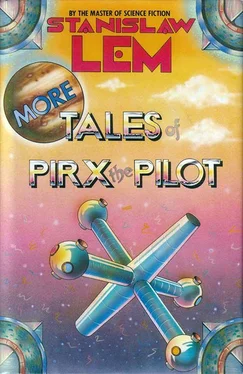There was a commotion in the hall: Pirx was going after some of the most respected—hallowed—names in astronautics! The managing director acknowledged receipt of the questions and promised a reply within a few minutes.
Pirx felt a twinge of remorse. Making such official inquiries was a bad business. Hot only did he risk his colleagues’ enmity, but he also cast doubt on his own credibility in the final round—in case of a dissenting vote. His attempt to widen the investigation beyond the technical, to introduce the human factor, could be interpreted as bowing to pressure from Van der Voyt. The moment he deemed it in the shipyard’s interest, the director would immediately move to squelch him by dropping a few veiled hints to the press. He would toss them Pirx as a bumbling comrade-in-arms. It was a long shot, but it was the only thing he had left. There was no time to make discreet, indirect inquiries. Not that he entertained any actual suspicions. A hunch, maybe. Some vague notions about the dangers arising not from men or machines so much as from their collision, because the reasoning of men and computers was so awfully different. And something else, something he had sensed as he stood before the bookshelf, but which he couldn’t even begin to express in words.
Earth’s reply was immediate: The simulation supervisors monitored their computers from start to finish, and were held responsible for any malfunctions the moment they signed their “diplomas.” The Anabis ’s computer had been tested by Stoernhein, the others by Cornelius. Pirx couldn’t wait to leave the room. Tension was already running high; he could feel it.
The session ended at eleven. Romani signaled to get Pirx’s attention, but he pretended not to notice and made a speedy getaway. Shutting himself up in his cubicle, he collapsed on the cot and took to staring up at the ceiling. Mint and Stoernhein didn’t count, only Cornelius. A rational, scientific mind would have started with the question: was there anything a supervisor might have overlooked? A negative answer would have barred any further inquiry. But Pirx wasn’t blessed with a scientific mind, so the question never occurred to him. Nor did he bother to analyze the testing procedure, as if intuiting the futility of such efforts. No, his thoughts were of Cornelius, of the man he once knew, fairly well in fact, though they had long since gone their separate ways. Their relationship had not been the merriest, which was hardly surprising, given that Cornelius had commanded the Gulliver when Pirx was still a rookie. On board, Cornelius was a Bastard of exactitude. He was called a brute, a nitpicker, a skinflint, and a fly-swatter (he had been known to mobilize half the crew to hunt down a stowaway fly).
Pirx smiled in recollection of the eighteen months he had spent under the stickler Cornelius. Now he could afford to smile; at the time, Cornelius had driven him nuts. What a by-the-book man! Even so, he was listed in the encyclopedia for his work on planetary exploration, especially Neptune. Short, pasty-looking, always mean-tempered, he suspected everybody of wanting to con him. When he threatened periodic body searches—to prevent flies from being smuggled aboard—nobody took him seriously, but Pirx knew it was not just an idle threat: Cornelius kept a big box of DDT in his desk drawer. Sometimes, in the middle of a conversation, he would stiffen, raise his finger (God help those who didn’t freeze), and strain his ears to pick up what sounded like a buzzing. A plumb line and a steel measuring tape always in his pocket, he made a cargo inspection more like an inquest at the site of an accident that, though not yet materialized, was imminent. Pirx could still hear them yelling, “Here comes Old Sliderule—everybody scram!,” thereby evacuating the mess hall while Cornelius’s eyes, seemingly blank, scoured the place for any irregularities.
Tics are quite common among veteran rocket jockeys, but Cornelius broke all records. He was allergic to having anyone stand behind his back; if he inadvertently sat down in a chair just vacated, he would jump up in mortal terror the moment he came into contact with the warm seat. He belonged to that species of man impossible to imagine as ever having been young. Visibly frustrated by the imperfection of everyone around him, he anguished over his inability to convert them to his own pedantry. He would tick off one column after another, and he wasn’t satisfied unless everything was checked and rechecked at least twenty—Pirx suddenly went numb and then sat down as if he were made of glass. His thoughts, stumbling through a maze of memories, had tripped an alarm.
Couldn’t stand anybody behind his back. Hassled the crew. So? But somehow… He felt like a little boy with his hand clasped around a bug, who holds his clenched fist up close, afraid to open it. Easy does it.
Cornelius was notorious for his rituals. (Was that it? he wondered.) At the slightest change in regulations, however minor, he would shut himself up in his cabin until the revised rule had been committed to memory. (It was becoming a game of hide-and-seek; let’s see, it was nine, no, ten years since they’d last seen each other.) Cornelius had somehow vanished from the public eye, at the height of his Neptune fame. There were rumors that the lecturing was only temporary, that he was going back aboard ship, but he never did. (Another dead end.) An anonymous letter. (Where the hell…?) What anonymous letter? About his being sick and covering up? That he was a heart-attack risk? No. That was another Cornelius—Cornelius Craig—one, a first name; the other, a surname. (A simple mix-up of names.) But that anonymous letter wouldn’t go away, wouldn’t stop hounding him. The more emphatically he tried to dismiss it, the more adamantly it returned. He sat hunched over, his head in a muddle. An anonymous letter… He was almost sure of it now—a play on words, one of those cases of word substitution, a wrong signal, a stand-in for something else, impossible to shake loose or to fathom … ANONYMOUS.
He got up. On the bookshelf, he recalled, among all the books devoted to Mars, was a huge dictionary. He opened it at random to An. Ana. Anachronism. Anaclastic. Anaconda. Anacreontic. Anacrusis. Analects. (There were so many words he didn’t know…) Analysis. Ananke (Gk.): goddess of destiny (Was that the…? But what did a goddess have to do…?); also: compulsion.
The scales fell from his eyes. He could see the office, the doctor with his back to him, talking on the phone; an open window, sheets of paper on the desk, furling and unfurling in the breeze. A routine check-up. He hadn’t meant to read the typed document, but his eyes couldn’t resist the printed word—as a boy he had rigorously trained himself to read upside down. Warren Cornelius. Diagnosis: anankastic syndrome. He recalled how the psychiatrist, spotting the forms scattered haphazardly on the desk, had bunched them together and stuffed them into his briefcase. Pirx had often wondered about that diagnosis, but he sensed the impropriety of prying, and then he forgot about it. Let’s see, how many years ago was that? At least six.
He put down the dictionary, agitated, flushed, but also a little disillusioned. Ananke—compulsion—compulsive neurosis, probably. An obsessive compulsive? Even as a boy—there must have been something in the family history—he’d hunted for definitions, and now his memory—nobody could accuse him of not having a good memory—though not without resistance, began to yield those medical descriptions. Phrases from the medical encyclopedia flashed before him, revelatory, casting Cornelius in a totally new light.
It was a spectacle as mean as it was pitiable. So that’s why the compulsion to wash his hands by the hour, to comb the ship for flies; why he flew into a rage when he lost a bookmark, why he kept his towel under lock and key and wouldn’t occupy anyone else’s chair. One compulsion compounded by another, a whole complex, overwhelming him, exposing him to ridicule. Sooner or later, the doctors had to notice. Finally he was relieved of his command. Straining his memory, Pirx thought he could recall the phrase underlined in the lower margin: Disqualified for duty. And since the psychiatrist knew nothing of computers, he gave Cornelius clearance to work at Syntronics. He probably thought it an ideal place for a pedant like him. What better way to show off his meticulousness! It could only do him good. A responsible position and—most important of all—one closely allied with astronautical science…
Читать дальше












